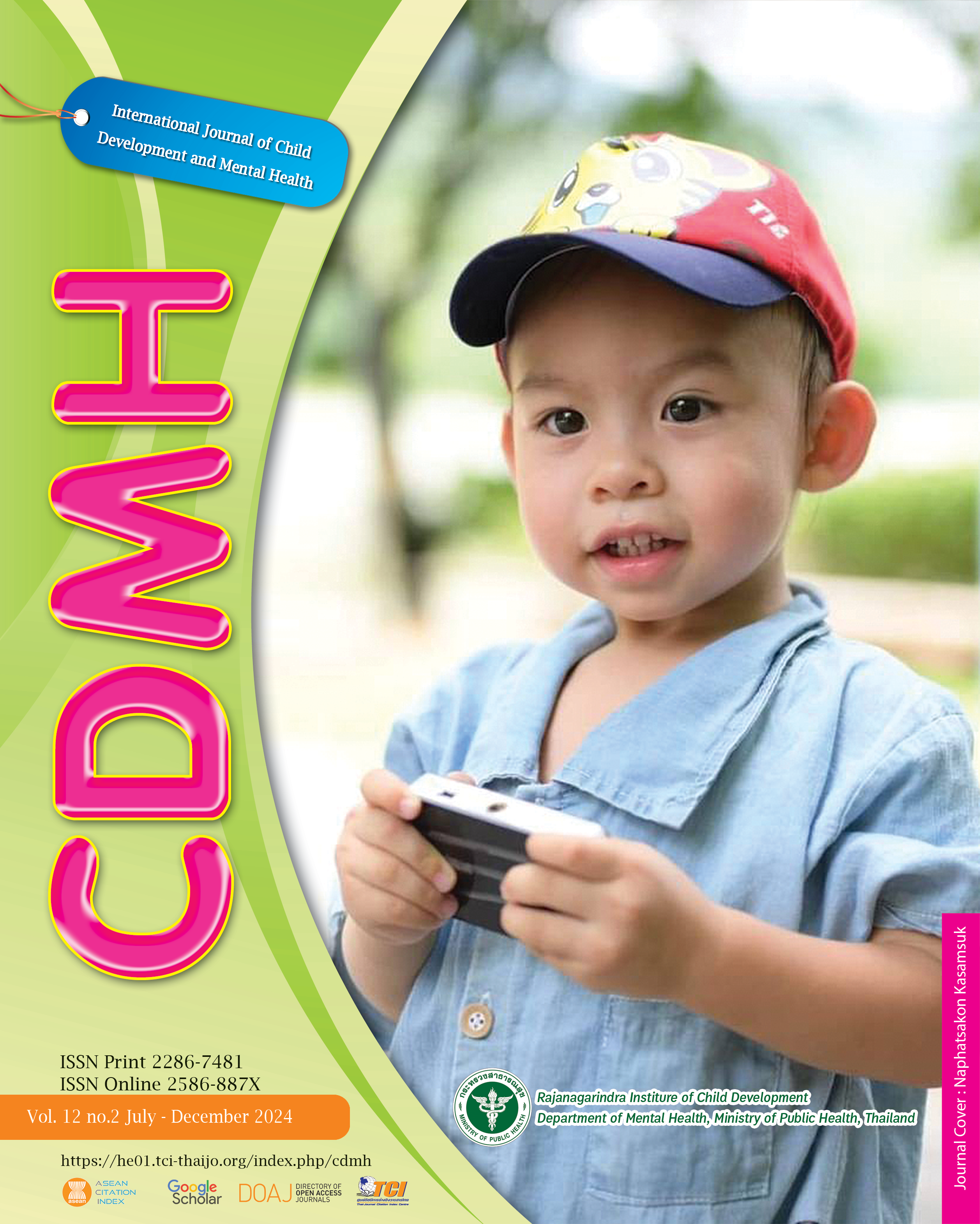Evaluation of Child Health Promotion Researches in Roi Kaen Sarasin Area 7 for Being Smart, Good and Happy Children Evaluation of Smart Kids 4.0 Area 7
Main Article Content
Abstract
The objective of this Project evaluation research was to evaluate the performance of “The Evaluation of Child Health Promotion Researches in Roi Kaen Sarasin Area 7 for Being Smart, Good and Happy Children (Smart Kids 4.0 Area 7) in Health Region 7. This research used the Stufflebeam’s CIPP Model evaluation approach, dividing the research process into three phases. Assessment Phase: Evaluating context and input through interviews with health promotion leaders or deputy leaders at the provincial health offices and summarizing supervision and inspection reports. Data was analyzed using content analysis and report preparation, Intervention Phase: Evaluating the project process. The target group consists of 4,500 families with young children. Data was collected using questionnaires validated for quality, and analyzed using descriptive statistics, paired T-tests. Evaluation Phase: Evaluating the product through interviews with purposefully selected samples. Data was collected using validated questionnaires. Results: 1. Assessment Phase The context is a community predominantly engaged in agriculture. More than half of the caregivers for preschool-aged children are grandparents 2. Intervention Phase Post-training, 60% of parents showed improved child-rearing skills, 89.9% of children showed age-appropriate development and emotional intelligence improved by 76.68 %. 3. Evaluation Phase: Children participating in the project improved in developmental and emotional intelligence. Children's behavior at home and in early childhood centers/schools improved positively. Program Implementation: The program extends into the classroom, integrating with teaching activities, daily experiences, and activities for children. It also encourages parents to implement these activities at home issues. Concerning the role of education, participants expressed an integration of Violence Against Women topics into various social studies, gender subjects, and health education to promote awareness and foster an inclusive environment.
Article Details

This work is licensed under a Creative Commons Attribution-NonCommercial-NoDerivatives 4.0 International License.
![]()
Creative Commons License
This work is licensed under a Creative Commons Attribution-NonCommercial-No Derivatives 4.0 International (CC BY-NC-ND 4.0)
The authors retain copyright and permit the journal the copyright of first publication
Articles, once having passed the review process and accepted for publication in the CDMH Journal, are copyrighted under the CDMH Journal, Department of Mental Health, Ministry of Public Health. Please be aware distribution of CDMH Journal content for commercial purposes without permission is expressly prohibited. However, distribution with intent to educate, advocate, or spread awareness within the general public and research communities is permitted and encouraged with the understanding that the CDMH Journal Editorial Board do not hold jurisdiction or liability for any accompanying comments, text, or information from third parties, either in favor for or against the original article’s assertions, conclusions, methodology, or content.
References
Boonjeam, S. (2021). Factors Associated with development of early childhood in the area health region VII. Journal of Regional Health Promotion Centre 7. Khonkaen.,14(1),41-60. [In Thai]
Department of Health. (2017). Concepts and principles of health literacy organizations. Retrieved July 9, 2021, from https://mwi.anamai.moph.go.th/webupload /migrated/iles/mwi/n1139_a5a9caa9ec03f3d810c 1f83cb7da874e_article_20180924133139.pdf
Health Data Center (HDC). (2022, August 22). The percentage of early childhood children with age-appropriate development. from https://www. dmh-elibrary.org/items/show/1568/.[in Thai].
Inson, S., Aonkam, Y., & Ruangrith, R. (2021). Effectiveness of development promotion and reinforce positive to improve discipline programs base on family participation to children aged 3-5 years in Mahasarakham Province. Academic Journal of Mahasarakham Provincial Public Health Office, 5(10), 143-160.
Juengsiragulwit, D., Thanasuparutana, A., & Limsue pchuea, K. (Eds.). (2022). Preschool parenting program: Triple P. Chiang Mai: Siam Pimnana Co., Ltd. Retrieved July 9, 2021, from https://dmh -elibrary.org/items/show/541
Limanond, A., Wancharoon, K., & Nasaan, S. Ministry of Public Health. (2020). Development Surveillance and Promotion Manul (DSPM). Bangkok: The War Veterans Organization of Thailand Printing Office. [in Thai].
Mental Health Center 7. (2023). Smart Kids Area 7: SA manual . : Mental Health Center 7.
Retrieved from https://mhc7.dmh.go.th/
Rajanukul Institute, Department of Mental Health. (2014). Manual for developing emotional intelligence in early childhood for parents and guardians (1st ed.). Nonthaburi: Cooperative League of Thailand Press. [in Thai].
González, M. R., Primé-Tous, M., Bondelle, E. V., Vázquez-Morejón, A., Santamarina, P., Morer, A., & Lázaro, L. (2021). Parents’ emotional intelligence and their children’s mental health: A systematic review. Journal of Psychiatry and Psychiatric Disorders, 5(2), 58-75.
Rajanukul Institute, Department of Mental Health .(2021) Survey of the Situation of Intelligence Quotient (IQ) and Emotional Intelligence (EQ) of Thai First Grade Students, 2021.. [Internet].Retrieved May 5, 2023, Retrieved from https://www.dmh-elibrary.org/items/show/1568
Stufflebeam, D. L. (2003). The CIPP model for evaluation. In The international handbook of
educational evaluation (pp. 31-62). Springer.
Sriwongpanich, N. (Ed.). (2022). Manual for developing emotional intelligence in early childhood for parents and guardians (3rd ed.). Bangkok: Cooperative League of Thailand Press. [in Thai].
The national institute of child development . (2021). Summary of performance outcomes for the
success indicators of driving the implementation of the Memorandum of Understanding (MOU) on health promotion and environmental health, which has been effectively translated into action. Retrieved from https://nich.anamai.moph.go.th/en/home?language =en
Yawinchan, C., Khanthamool, V., & Netthip, R. (2019). Effectiveness of the emotional Quotient and Reinforce positive to improve discipline in early childhood program base on family participation in pua district, Nan Province. Northern Health Academic Journal, 6(1), 70-85. [in Thai].


